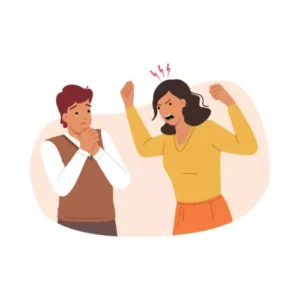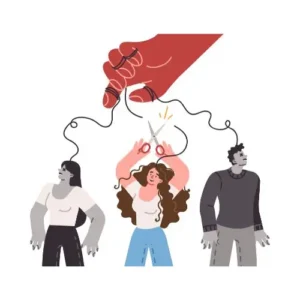Opening Thoughts
As much as people try to make every relationship perfect, there are always days when things don’t work out as planned. But some behavioral patterns are too extreme, or toxic as they are sometimes called. People suffering from toxic relationship complexities can learn and seek a healthier relationship by recognizing these early stages. In this article, the author focuses on vague but worrisome red flags to notice when first starting a relationship and how to handle toxic behavior in a relationship appropriately.
Signs Of A Toxic Relationship
1. Humiliation
- If a person continually comments on your ability to do things wrong or accuses you of something you are not guilty of, they teach you that you can do nothing right in their eyes. The purpose of this behavior is to at least in some ways, cause you to doubt yourself and feel less certain about your abilities.
2. Social isolation
- policies limit the frequency and opportunity that one has to interact with friends, and family, or engage in a preferred personal activity. Manipulative partners may use a series of tactics to alienate you from your family and friends by making you think that they are making you spend more time with them only.
3. Over-possessiveness
- This is also referred to as over-possessive jealousy and such things as checking your social media frequently, accusing your partner of cheating when there is no proof, stalking your movements, etc. Paranoia is bad; a certain measure of jealousy is healthy, as it makes people conscious of their relationships.
4. Seduction
- Coercive actions sometimes coerce your feelings to compel you to do something or drive a certain feeling. This could mean persuading you to engage in activities that are unpopular with you or changing the way you perceive something. It is always latent but malignant nonetheless.
5. Guilt-tripping
- Making you feel guilty over things you have done, or things that have happened, to get you to do things you do not want to do. This may include threats of self-harm or the use of telling phrases such as ‘You’ve let me down’, to try and manipulate you into doing what they want.
6. Gaslighting
- Gaslighting is a situation where the other person ignores or metavariables your reality in a way that makes it hard for you to see reality. This could mean frowning the event or even lying to put your emotions off balance.
7. Controlling Nature
- One of the dangerous signs of a toxic partner is one seeking to regulate your attire, visitors, or destination among others. They can spy on your phone, and social networking profiles, follow you in reality, and make decisions for you, which is a loss of your self-governance.
8. Blow-ups and guilt:
- Regular episodes of anger that make them pin the feeling or situation on others hinder effective problem-solving efforts. These actions do not allow the proper functioning of the subsequent communication and conflict solutions.
- Financial Control
- Another form of control is when one partner decides to limit the availability of the finances or manage the expenses exercise. The failure to let one open savings accounts or earn cash also deprives you of your liberty.
- Physical Abuse
- Any type of contact that may cause physical injury is abusive, including shoving, hitting, or even just restraining a child. Door slamming or throwing objects in anger, right, these are also signs of a far more dangerous toxicity.
How Normal Relationship Challenges Differ from Toxic Behaviors

Disputes occur in any human interactions and interpersonal disputes, but they are healthy if situations that are strained when solving them involve respect for one another as well as compromise. Posted behaviors instead are toxic when the behavior involves condescending, denying, or even using force or forceful language in the process.
Healthy Conflict: The power of some open conversations, discussions on the needs people have and the ways they respect the needs of the other, and learning how to work together to find common solutions.
Toxic Behavior: Ignoring the other person’s feelings, minimizing the importance of the individual’s wants, and using forceful or abusive strategies to regulate the relationship.
Subtle Early Signs Often Overlooked
At times, when the relationship gets toxic it appears to start with minor issues that may create a feeling of discomfort. It is always advisable to ignore or avoid those minor concerning behaviors to help avoid their escalation. Watch out for:
- They always turn the discussion into their accomplishments.
- Avoiding compromise or solution-finding for any issue, or attributing lesser problems to your actions or behavior patterns.
- To add towards behaving in a way that Asks for more effort from you without giving same.
- For example, they constantly tell you things like, ‘You are not as good as my ex’, or insist that some previous partner was preferable to you.
- A clear example is when you lower things you like while demanding excitement with their hobbies.
- Taking your turn and lapsing into silence as well as interrupting you to regain the floor.
- That is, simply being harsh to other individuals and condescending towards them.
- Deciding in the ‘last minutes’ to test how flexible you are or simply coming up with what will annoy you most.
- Operate or change one’s appearances, behavior, or personality slightly to reflect the “desirable”.
The Psychology of Manipulation in Early Stages

Toxic partners often use manipulation tactics to build dependence and erode boundaries:
- Love Bombing: Drowning you with kisses and texts that would build an emotional connection immediately.
- Future Faking: Exchanging a future of happiness for a life of suffering to bear today’s current hardships.
- Victim Playing: Losing face or using an apology to manipulate people by claiming they were mistreated or that the listeners once had a misunderstanding with the perpetrator.
- Benefit of Doubt: When you express your worries as an overreaction to certain actions, employing sweet words or persuasive words to make you stop worrying.
- Isolation: Slowly pulling your support system away by investing all of your time with him.
Emotional Changes Suggesting a Toxic Dynamic
Most toxic relations cause a person to conflict with their self. Ask yourself if you:
- Experience fear when you are around your partner or feel as if you must continually avoid things and be extra careful not to anger your partner.
- Create doubt about your perceptions or reality.
- Suffer from symptoms that affect the body such as lack of sleep, lack of appetite, or panic attacks.
- Eradicating every enthusiasm you possessed earlier for activities, friends, or some other hobbies you once had.
- Lack of relationship connection and feeling exhausted.
- The relationship is plagued by difficulty in separation and the inability to meet your partner’s emotional needs.
The Role of Control and Possession
Jealousy and power are components in toxic relationships. Behaviors to watch out for include:
- Telling you what clothes to wear, who to be friends with, or what activities are acceptable.
- Surveillance through phone or social media and accusing someone of something without any reason.
- They include controlling the use of financial or personal funds/connections.
- Verbal aggressive behaviors such as shouting, using foul language, ridicule, name-calling, ridicule or even cursing.
How to Talk to Your Partner About Toxicity
If concerning behaviors emerge, address them respectfully:
- Select an environment free of other people’s inputs during the conversation.
- Share the things that you did that made you uncomfortable and how they made you feel.
- In order not to make things more defensive, opt for “I feel”.
- State interest in love, care, and safety in the relationship that you want to have with your partner.
- It’s important to suggest counseling only if the behavior remains unchanged even after talking to the patient.
- It is imperative to have an evacuation plan in case the identified behavior increases, or does not change at all.
And although having doubts is normal, seeking support from our friends and family or creating a safety plan should you feel endangered, is also okay.
Final Thoughts
Toxicity is seldom abrupt; early signs of toxicity mean that problems can be solved from mutual respect before they worsen further. Because of these two components, many relational trajectories can be made better. But your life is precious and needs to be protected from any harm at all times.

